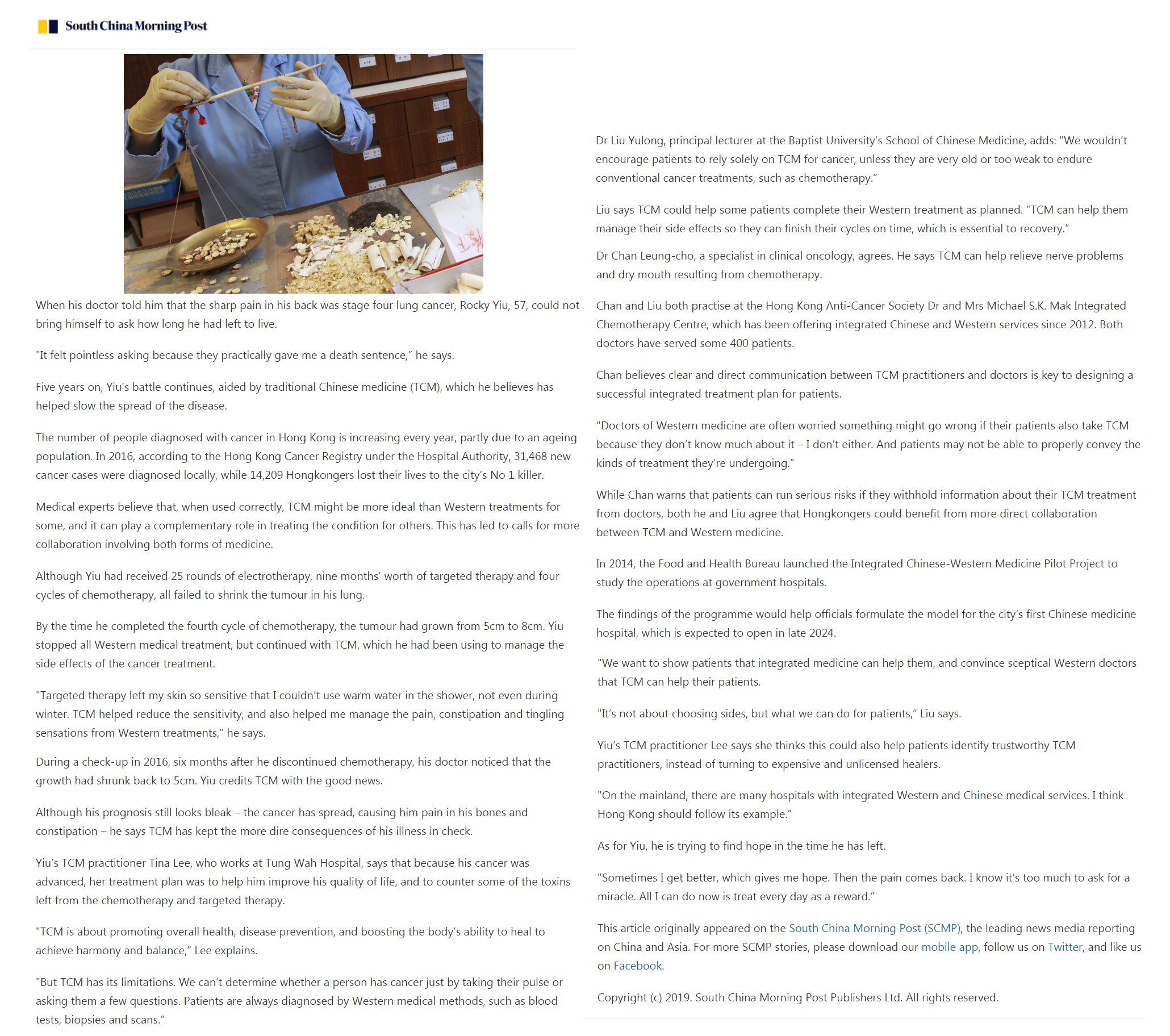When his doctor told him that the sharp pain in his back was stage four lung cancer, Rocky Yiu, 57, could not bring himself to ask how long he had left to live. “It felt pointless asking because they practically gave me a death sentence,” he says.
Five years on, Yiu’s battle continues, aided by traditional Chinese medicine (TCM), which he believes has helped slow the spread of the disease.
The number of people diagnosed with cancer in Hong Kong is increasing every year, partly due to an ageing population. In 2016, according to the Hong Kong Cancer Registry under the Hospital Authority, 31,468 new cancer cases were diagnosed locally, while 14,209 Hongkongers lost their lives to the city’s No 1 killer.
Medical experts believe that, when used correctly, TCM might be more ideal than Western treatments for some, and it can play a complementary role in treating the condition for others. This has led to calls for more collaboration involving both forms of medicine.
Although Yiu had received 25 rounds of electrotherapy, nine months’ worth of targeted therapy and four cycles of chemotherapy, all failed to shrink the tumour in his lung.
By the time he completed the fourth cycle of chemotherapy, the tumour had grown from 5cm to 8cm. Yiu stopped all Western medical treatment, but continued with TCM, which he had been using to manage the side effects of the cancer treatment.
“Targeted therapy left my skin so sensitive that I couldn’t use warm water in the shower, not even during winter. TCM helped reduce the sensitivity, and also helped me manage the pain, constipation and tingling sensations from Western treatments,” he says.
During a check-up in 2016, six months after he discontinued chemotherapy, his doctor noticed that the growth had shrunk back to 5cm. Yiu credits TCM with the good news.
Although his prognosis still looks bleak – the cancer has spread, causing him pain in his bones and constipation – he says TCM has kept the more dire consequences of his illness in check.
Yiu’s TCM practitioner Tina Lee, who works at Tung Wah Hospital, says that because his cancer was advanced, her treatment plan was to help him improve his quality of life, and to counter some of the toxins left from the chemotherapy and targeted therapy.
“TCM is about promoting overall health, disease prevention, and boosting the body’s ability to heal to achieve harmony and balance,” Lee explains.
“But TCM has its limitations. We can’t determine whether a person has cancer just by taking their pulse or asking them a few questions. Patients are always diagnosed by Western medical methods, such as blood tests, biopsies and scans.”
Dr Liu Yulong, principal lecturer at the Baptist University’s School of Chinese Medicine, adds: “We wouldn’t encourage patients to rely solely on TCM for cancer, unless they are very old or too weak to endure conventional cancer treatments, such as chemotherapy.”
Liu says TCM could help some patients complete their Western treatment as planned. “TCM can help them manage their side effects so they can finish their cycles on time, which is essential to recovery.”
Dr Chan Leung-cho, a specialist in clinical oncology, agrees. He says TCM can help relieve nerve problems and dry mouth resulting from chemotherapy.
Chan and Liu both practise at the Hong Kong Anti-Cancer Society Dr and Mrs Michael S.K. Mak Integrated Chemotherapy Centre, which has been offering integrated Chinese and Western services since 2012. Both doctors have served some 400 patients.
Chan believes clear and direct communication between TCM practitioners and doctors is key to designing a successful integrated treatment plan for patients.
“Doctors of Western medicine are often worried something might go wrong if their patients also take TCM because they don’t know much about it – I don’t either. And patients may not be able to properly convey the kinds of treatment they’re undergoing.”
While Chan warns that patients can run serious risks if they withhold information about their TCM treatment from doctors, both he and Liu agree that Hongkongers could benefit from more direct collaboration between TCM and Western medicine.
In 2014, the Food and Health Bureau launched the Integrated Chinese-Western Medicine Pilot Project to study the operations at government hospitals.
The findings of the programme would help officials formulate the model for the city’s first Chinese medicine hospital, which is expected to open in late 2024.
“We want to show patients that integrated medicine can help them, and convince sceptical Western doctors that TCM can help their patients.
“It’s not about choosing sides, but what we can do for patients,” Liu says.
Yiu’s TCM practitioner Lee says she thinks this could also help patients identify trustworthy TCM practitioners, instead of turning to expensive and unlicensed healers.
“On the mainland, there are many hospitals with integrated Western and Chinese medical services. I think Hong Kong should follow its example.”
As for Yiu, he is trying to find hope in the time he has left.
“Sometimes I get better, which gives me hope. Then the pain comes back. I know it’s too much to ask for a miracle. All I can do now is treat every day as a reward.”
